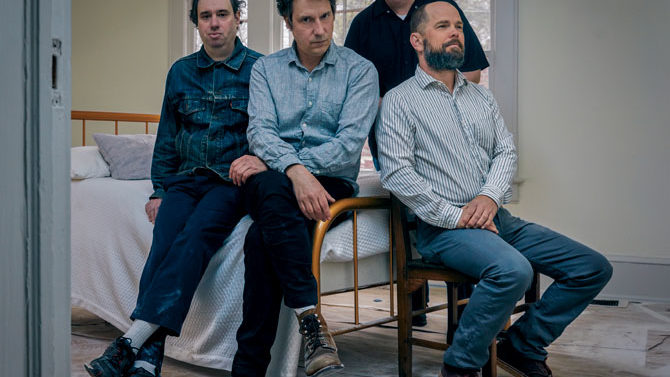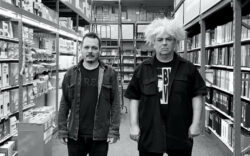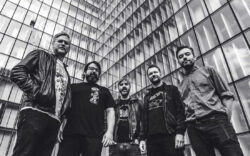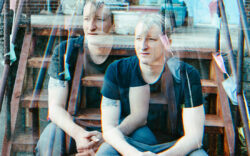After 18 years, Atlanta’s Rock*A*Teens returned this summer with Sixth House. While the group’s sixth album doesn’t throw any surprise punches, songs such as “Billy Really,” “Lady Macbeth” and “Crystal Skies” rise above the signature haze of reverb and distortion layered over singer and guitarist Chris Lopez’s haunting tales of heartache in the Deep South.
Flagpole caught up with the band’s Chris Lopez and T. Ballard Lesemann in advance of their show at the 40 Watt Club this Saturday. This interview has been edited for length.
Flagpole: Sixth House has a more refined sound than previous Rock*A*Teens albums. Did you want to dial back on the noise?
Chris Lopez: We wanted it to be less smeared out and messy. It’s always going to be a little smeared out and messy, but sometimes we don’t need to triple the guitars.
T. Ballard Lesemann: I’m playing a little less on some songs, rather than Keith Mooning it up. Everything was more focused. The producer said, “Play your sound.” Usually, it’s like, “This is what you guys sound like, we’re documenting it.” With this one we thought about the sound of the snare drum, or should we add a piano here? It was a great collaborative process with the studio—more than just banging out the songs. Everyone was in on it… Justin’s guitar parts—rhythm and lead—push us forward. Chris plays these complex, almost like jazz chords. Justin interprets that and puts something on top or lays back a bit. So, just two notes push it forward.
FP: The Rock*A*Teens are forever linked with the Cabbagetown music scene of the early ’90s. How has that influence carried on in your music?
TBL: When I started with The Rock*A*Teens, there was a whole community of bands living on that side of Atlanta, who would come play Athens, including Deacon Lunchbox, Smoke… They were part of an underground community. For us, in Athens, it felt like the Athens part of Atlanta, rather than the Black Crowes bands that wanted to be the next big rock stars.
CL: I played bass in Dirt with John Forbes, before I was in Seersucker. When he left for Chicago, I was already playing in bands, but that was my moment where I thought, if I’m going to have a band already around me, and sing and write songs, I had to do it. It was the whole Grant Park, Oakland Cemetery neck of the woods—it was the cheap part of town. You had to put up with some shit to live in the cheap part of town, but everyone was supportive. And there was Dottie’s, where if you had a band, you could play.
TBL: It was people who were broke but had the ability to be expressive—similar to what was happening in Athens. People let each other use their amps. “Do you need to play my guitar tonight? Do you need drumsticks?” It was generous compared to the other parts of Atlanta that I had seen.
FP: I’ve wondered if Tenement Halls’ song “Charlemagne” is about Benjamin from Smoke.
CL: Oh, could be… Benjamin appears in a few songs. He was a big influence on me, for good and for bad. Mostly good. His outlook and meeting him when I was very young—I saw many of the different ways of the world in him.
FP: You also sing about a character whistling “I Could Just Have Died,” which is a Rock*A*Teens song.
CL: There’s a whole thing going on in that song—it’s like a double double-cross. The double crosser gets double-crossed. As one of the characters walks away, she whistles nonchalantly. It was hard to fit something in there, but I wanted her to whistle a Rock*A*Teens song.
FP: Chris Verene’s photography has been an integral part of the Rock*A*Teens experience from the beginning. Aside from being the first drummer, what’s his relation to the group now?
CL: I wanted his photography to tie Sixth House to our older records. But I wanted it to look like how he presents his images in a gallery or a book, with a clean white page and minimal handwriting. That image worked on many levels in my screwy mind. There’s a tree on the house. Is it a disaster? Is it a disaster averted? Is it a catastrophe or a thing of beauty? It also kind of represents how the band is perceived. Chris and I discussed the tarot cards, the person playing solitaire, some astrology. It’s our sixth album… All of this tied it together, and we went back and forth on a lot of it.
FP: What was the first punk show you ever saw?
CL: When I was a kid, I went to a midnight movie to see The Kids Are Alright. It was a double feature with Rock ‘n’ Roll High School, and I was blown away by the Ramones. One of my friends stole the soundtrack from somewhere, and we drove around listening to it. Then they came to town! I wasn’t even driving age, and we saw them at a roller rink, or something.
When I was in college, this dude turned me onto SST and Black Flag. I went to a show at a VFW hall and saw Black Flag, Meat Puppets and Dag Nasty. Culturally, there wasn’t anything rock and roll about it. When I saw the Ramones, there were lights and a stage. But this was like fluorescent lights, and it was all out in the open. Black Flag… Henry Rollins wearing those dolphin shorts—that was fucking intense. Kira [Roessler] was playing bass. It was the most intense art experience I’d ever had.
TBL: The first punk show I saw was a kegger in Charleston. It was CCC—Civilian Chaos Core. They opened for the Uncalled Four. The singer was named Verb, and the drummer was named Skully—he had skulls all over his drum kit. The singer was reading lyrics from a notebook and tearing out pages and throwing them into the crowd. It was cool, but every song sounded the same. CCC was more proper hardcore, and it took me about a month to realize the pun in the Uncalled Four’s name.
Like what you just read? Support Flagpole by making a donation today. Every dollar you give helps fund our ongoing mission to provide Athens with quality, independent journalism.










